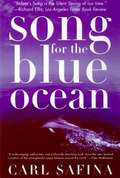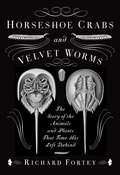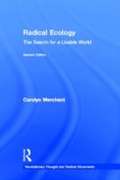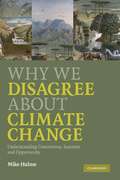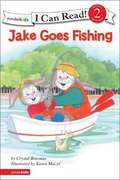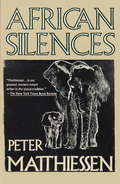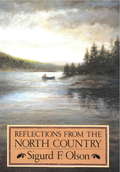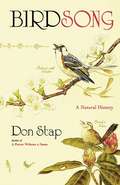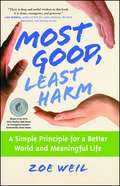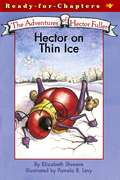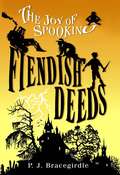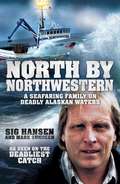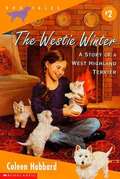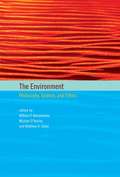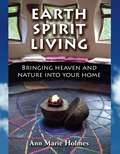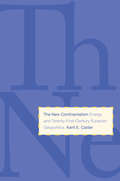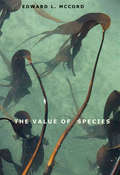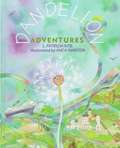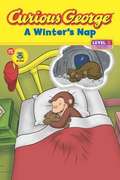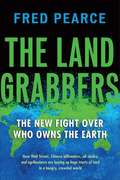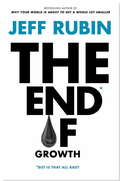- Table View
- List View
Ecopopulism: Toxic Waste and the Movement for Environmental Justice
by Andrew SzaszThis book reconstructs the growth of a powerful movement around the question of toxic waste, following the issue as it moves from the world of "official" policymaking in Washington, onto the nation's television screens and into popular consciousness, and then into America's neighborhoods, spurring the formation of thousands of local, community-based groups.
Song for the Blue Ocean: Encounters Along the World's Coasts and Beneath the Seas
by Carl SafinaPart odyssey, part pilgrimage, this epic personal narrative follows the author's exploration of coasts, islands, reefs, and the sea's abyssal depths. Scientist and fisherman Carl Safina takes readers on a global journey of discovery, probing for truth about the world's changing seas, deftly weaving adventure, science, and political analysis.
Horseshoe Crabs and Velvet Worms
by Richard ForteyFrom one of the world's leading natural scientists and the acclaimed author of Trilobite!, Life: A Natural History of Four Billion Years of Life on Earth and Dry Storeroom No. 1 comes a fascinating chronicle of life's history told not through the fossil record but through the stories of organisms that have survived, almost unchanged, throughout time. Evolution, it seems, has not completely obliterated its tracks as more advanced organisms have evolved; the history of life on earth is far older--and odder--than many of us realize. Scattered across the globe, these remarkable plants and animals continue to mark seminal events in geological time. From a moonlit beach in Delaware, where the hardy horseshoe crab shuffles its way to a frenzy of mass mating just as it did 450 million years ago, to the dense rainforests of New Zealand, where the elusive, unprepossessing velvet worm has burrowed deep into rotting timber since before the breakup of the ancient supercontinent, to a stretch of Australian coastline with stromatolite formations that bear witness to the Precambrian dawn, the existence of these survivors offers us a tantalizing glimpse of pivotal points in evolutionary history. These are not "living fossils" but rather a handful of tenacious creatures of days long gone. Written in buoyant, sparkling prose, Horseshoe Crabs and Velvet Worms is a marvelously captivating exploration of the world's old-timers combining the very best of science writing with an explorer's sense of adventure and wonder.
Managing Geographic Information Systems, Second Edition
by Jeffrey Pinto Nancy ObermeyerNow in a fully revised and expanded second edition, this widely adopted text and practical reference addresses all aspects of developing and using geographic information systems (GIS) within an organization. Coverage includes the role of the GIS professional, how geographic information fits into broader management information systems, the use of GIS in strategic planning, and ways to navigate the organizational processes that support or inhibit the success of GIS implementation. All chapters retained from the prior edition have been thoroughly updated to reflect significant technological, empirical, and conceptual advances, as well as the changing contexts of GIS use. New chapters discuss organizational politics, metadata, legal issues, and GIS ethics.
Radical Ecology: The Search for a Livable World (2nd edition)
by Carolyn MerchantIn the first edition of Radical Ecology--the now classic examination major philosophical, ethical, scientific, and economic roots of environmental problems--Carolyn Merchant responded to the profound awareness of environmental crisis which prevailed in the closing decade of the twentieth century. In this provocative and readable study, Merchant examines the ways that radical ecologists can transform science and society in order to sustain life on this planet. Now in this second edition, Merchant continues to emphasize how laws, regulations and scientific research alone cannot reverse the spread of pollution or restore our dwindling resources. Merchant argues that in order to maintain a livable world, we must formulate new social, economic, scientific, and spiritual approaches that will fundamentally transform human relationships with nature. She analyzes the revolutionary ideas of visionary ecologists for a new economy, society, science, and religion, and examines their efforts to bring environmental problems to the attention of the public. This new edition features a new Introduction from the author, a thorough updating of chapters, and two entirely new chapters on recent global movements and globalization and the environment. It is a timely update that will give students everything they need to know on the most recent philosophical positions and social movements that characterize the radical ecology spectrum.
Addressing the Natural Resource Curse: An Illustration from Nigeria
by Xavier Sala-i-Martin Arvind SubramanianNigerian natural resource management.
Why We Disagree about Climate Change: Understanding Controversy, Inaction and Opportunity
by Mike HulmeClimate change is not 'a problem' waiting for 'a solution'. It is an environmental, cultural and political phenomenon which is re-shaping the way we think about ourselves, our societies and humanity's place on Earth. Drawing upon twenty-five years of professional work as an international climate change scientist and public commentator, Mike Hulme provides a unique insider's account of the emergence of this phenomenon and the diverse ways in which it is understood. He uses different standpoints from science, economics, faith, psychology, communication, sociology, politics and development to explain why we disagree about climate change. In this way he shows that climate change, far from being simply an 'issue' or a 'threat', can act as a catalyst to revise our perception of our place in the world. Why We Disagree About Climate Change is an important contribution to the ongoing debate over climate change and its likely impact on our lives.
Jake Goes Fishing (I Can Read! #Level 2)
by Crystal BowmanSpilled worms and a snagged hook threaten to ruin Jake's fishing trip. He wants to have fun with his father. But what if there are no fish to bring home for dinner? Although he makes some mistakes at first, Jake spends a wonderful day fishing with his father, then enjoying a very special fish dinner. Picture descriptions present.
African Silences
by Peter MatthiessenAfrican Silences is a powerful and sobering account of the cataclysmic depredation of the African landscape and its wildlife. In this critically acclaimed work Peter Matthiessen explores new terrain on a continent he has written about in two previous books, A Tree Where Man Was Born -- nominated for the National Book Award -- and Sand Rivers.Through his eyes we see elephants, white rhinos, gorillas, and other endangered creatures of the wild. We share the drama of the journeys themselves, including a hazardous crossing of the continent in a light plane. And along the way, we learn of the human lives oppressed by bankrupt political regimes and economies, and threatened by the slow ecological catastrophe to which they have only begun to awaken.
Reflections from the North Country
by Sigurd F. OlsonWritten in the last years of his life, Reflections from the North Country is often considered Sigurd Olson's most intellectually significant work. In an account alive with anecdote and insight, Olson outlines the wilderness philosophy he developed while working as an outspoken advocate for the conservation of America's natural heritage. Based on speeches delivered at town meetings and government hearings, this book joins The Singing Wilderness and Listening Point as the core of Olson's work. Upon its initial publication in 1976, Reflections from the North Country, with Olson's unique combination of lyrical nature writing and activism, became an inspiration to the burgeoning environmental movement, selling over 46,000 copies in hardcover. In this wide-ranging work, Olson evokes the soaring grace of raven, osprey, and eagle, the call of the loon, and the song of the hermit thrush. He challenges the reader to loosen the grasp of technology and the rush of contemporary life and make room for a sense of wonder heightened by being in nature. From evolution to the meaning and power of solitude, Olson meditates on the human condition, offering eloquent testimony to the joys and truths he discovered in his beloved north-country wilderness.
Birdsong
by Don StapFollowing one of the world's experts on birdsong from the woods of Martha's Vineyard to the tropical forests of Central America, Don Stap brings to life the quest to unravel an ancient mystery: Why do birds sing and what do their songs mean? We quickly discover that one question leads to another. Why does the chestnut-sided warbler sing one song before dawn and another after sunrise? Why does the brown thrasher have a repertoire of two thousand songs when the chipping sparrow has only one? And how is the hermit thrush able to sing a duet with itself, producing two sounds simultaneously to create its beautiful, flutelike melody? Stap's lucid prose distills the complexities of the study of birdsong and unveils a remarkable discovery that sheds light on the mystery of mysteries: why young birds in the suborder oscines -- the "true songbirds" -- learn their songs but the closely related suboscines are born with their songs genetically encoded. As the story unfolds, Stap contemplates our enduring fascination with birdsong, from ancient pictographs and early Greek soothsayers, who knew that bird calls represented the voices of the gods, to the story of Mozart's pet starling. In a modern, noisy world, it is increasingly difficult to hear those voices of the gods. Exploring birdsong takes us to that rare place -- in danger of disappearing forever -- where one hears only the planet's oldest music.
Most Good, Least Harm
by Zoe WeilWith a world steeped in materialism, environmental destruction, and injustice, what can one individual possibly do to change it? While the present obstacles we face may seem overwhelming, author and humane educator Zoe Weil shows us that change doesn't have to start with an army. It starts with you. Through her straightforward approaches to living a MOGO, or "most good," life, she reveals that the true path to inner peace doesn't require a retreat from the world. Rather, she gives the reader powerful and practicable tools to face these global issues, and improve both our planet and our personal lives. Weil explores direct ways to become involved with the community, make better choices as consumers, and develop positive messages to live by, showing readers that their simple decisions really can change the world. Inspiring and remarkably inclusive of the interconnected challenges we face today, Most Good, Least Harm is the next step beyond "green" -- a radical new way to empower the individual and motivate positive change.
Hector on Thin Ice
by Elizabeth ShreeveIn order for Hector to throw his annual winter party, he has to expand his hole to fit all his guests--but a giant pebble is standing in the way. And he's really got to move it when his brother Cosmo--and all of Cosmo's wumblepups--move in for the winter!
Fiendish Deeds
by BracegirdleDo you dare set foot in Spooking? It's the terrible town on the hideous hill -- and Joy Wells is a proud resident. A fan of classic horror stories, Joy is convinced that famous author E. A. Peugeot based his spine-tingling tales on Spooking. Take the eerie similarities between the nearby swamp and the setting of his masterpiece, "The Bawl of the Bog Fiend." Could the story be true? Could the bog fiend be on the loose? Things become truly horrifying when Joy learns that Darlington, the despicable suburban city where she is forced to go to school, is planning to build a water park over her beloved bog. It is up to her to safeguard the endangered area and its secrets. Little does she know that there is someone determined to destroy not only the bog but the town of Spooking itself -- and anyone who dares stand in his way. P. J. Bracegirdle spins a yarn of delicious devilry and macabre mayhem in the very first book of The Joy of Spooking trilogy.
North by Northwestern: A Seafaring Family on Deadly Alaskan Waters
by Sig Hansen Mark SundeenSig Hansen has been a star of the Channel 4's The Deadliest Catch from the pilot to the present. Seen in over 150 countries, the show attracts more than 49 million viewers per season, making it one of the most successful series in the history of cable TV. With its daredevil camera work, unpredictably dangerous weather, and a setting as unforgivable and unforgettable as the frigid Bering Sea, The Deadliest Catch is unlike anything else on television. But the weatherworn fishermen of the fishing vessel Northwestern have stories that don't come through on TV. For Sig Hansen and his brothers, commercial fishing is as much a part of their Norwegian heritage as their names. Descendents of the Vikings who roamed and ruled the northern seas for centuries, the Hansens' connection to the sea stretches from Alaska to Seattle and all the way to Norway. And after twenty years as a skipper on the commercial fishing vessel the Northwestern -- which was his father's before him -- Sig has lived to tell the tales. To be a successful fisherman, you need to be a mechanic, navigator, welder, painter, carpenter, and sometimes, a firefighter. To be a successful fisherman year after year, you need to be a survivor. This is the story of a family of survivors; part memoir and part adventure tale, North by Northwestern brings readers on deck, into the dockside bars and into the history of a family with a common destiny. Built around a gripping tale of a deadly shipwreck like The Perfect Storm, North by Northwestern is the multi-generational tale of the Hansen family, a clan of tough Norwegian-American fishermen who, through the popularity of The Deadliest Catch, have become modern folk-heroes.
The Westie Winter: A Story of a West Highland Terrier (Dog Tales #2)
by Coleen Hubbard[From the back cover:] Who could say no to a puppy? Every Christmas, Kelly asks her parents for a puppy. But she never gets one. This year Kelly has a great idea. She'll get a puppy for somebody who loves dogs as much as she does -- her Grandpa Dunc, who has just moved in with Kelly's family. Kelly meets a breeder and picks the perfect puppy on her own. But suddenly Grandpa Dune starts acting strange. Could the puppy present be all wrong? Book jacket. If you love dogs, Bookshare has more books in the Dog Tales series for you. Check out #1 The Golden Year: A Story of a Golden Retriever, #3 Mountain Dog Rescue: A Story of a Bernese Mountain Dog, and #4 The Great Spaniel Escape.
Skeeter
by Kay Jordan SmithThe adventures of two young boys befriended by an old black man who is a legendary hunter.
The Environment
by William P. Kabasenche Michael O'Rourke Matthew H. SlaterPhilosophical reflections on the environment began with early philosophers' invocation of a cosmology that mixed natural and supernatural phenomena. Today, the central philosophical problem posed by the environment involves not what it can teach us about ourselves and our place in the cosmic order but rather how we can understand its workings in order to make better decisions about our own conduct regarding it. The resulting inquiry spans different areas of contemporary philosophy, many of which are represented by the fifteen original essays in this volume. The contributors first consider conceptual problems generated by rapid advances in biology and ecology, examining such topics as ecological communities, adaptation, and scientific consensus. The contributors then turn to epistemic and axiological issues, first considering philosophical aspects of environmental decision making and then assessing particular environmental policies (largely relating to climate change), including reparations, remediation, and nuclear power, from a normative perspective.
Earth Spirit Living
by Ann Marie HolmesEarth Spirit Living is a revolutionary approach to lifestyle design and personal space. Author Ann Marie Holmes, an expert on earth energy systems, reveals that by picking up subtle cues from the natural world, we can create healthy, enjoyable, and sustainable living spaces. She shows how we can effectively incorporate principles of sacred geometry, human intuition, and the power of space, shape, and layout to become aware of -- and collaborate with -- the earth's energies. Perfect for homeowners, renters, business owners, professional designers, and builders, Earth Spirit Living illuminates the benefits of living in cooperation with our environment, including: * a more comfortable home * increased effectiveness in your work * healthier, calmer living conditions * enhanced work and personal relationships * improved prosperity * smoother construction or remodeling process Insightful illustrations, ceremonies, cures, attunements, and visualizations will help you hone your natural instincts and strengthen your connection to your physical space. With client stories and personal anecdotes, Holmes guides you on the journey toward a balanced life and living space that harnesses the energy and wisdom of nature.
The New Continentalism
by Kent E. CalderIn this groundbreaking book Kent E. Calder argues that a new transnational configuration is emerging in Asia, driven by economic growth, rising energy demand, and the erosion of longstanding geopolitical divisions. What Calder calls the New Silk Road—with a strengthening multi-faceted relationship between East Asia and the Middle East at its core—could eventually emerge as one of the world’s most important multilateral configurations. Straddling the border between comparative politics and international relations theory, this important book will stimulate debate and discussion in both fields.
The Value of Species
by Edward L. MccordWe humans value a great variety of plant and animal species for their usefulness to us. But what is the value--if any--of a species that offers no practical use? In the face of accelerating extinctions across the globe, what ought we to do? Amid this sea of losses, what is our responsibility? How do we assess the value of nonhuman species? In this book, naturalist and philosopher Edward L. McCord explores urgent questions about the destruction of species and provides a new framework for appreciating and defending every form of life. The book draws insights from philosophy, ethics, law, and biology to arrive at a new way of thinking about the value of species to humanity is intellectual: individual species are phenomena of such intellectual moment--so interesting in their own right--that they rise above other values and merit enduring human embrace. The author discusses the threats other species confront and delineates the challenges involved in creating any kind of public instrument to protect species.
Dandelion Adventures
by L. Patricia KiteThe wind blows, and several tiny dandelion seed parachutes fly into the air. One lands in a sidewalk crack, another at the edge of a forest, while three others land in a garden, a park, and on a muddy shore. One seed lands on a ship and sails off to a foreign land. The last one lands in a schoolyard, where it takes root and matures. A child puffs on the feathery white ball and seventy little seed parachutes fly away--where might they land? In simple words and beautiful pictures, the story of how this most widespread of weeds regenerates is unfolded for young readers.
Curious George A Winter's Nap (CGTV Reader)
by H. A. ReyAfter learning about hibernation, George decides that the best way to spend the cold winter months is the way that bears do it--fast asleep! But first it's too bright in his room; then it's not cave-like enough; and then it's too loud. When George finally does get to sleep, he wakes up to discover that he slept only one night, not the whole winter! Will George be convinced that winter can be a wonderland of fun after all? Includes a question-and-answer activity on hibernation as well as a craft project to make your own teddy bear cave.
The Land Grabbers
by Fred PearceAn unprecedented land grab is taking place around the world. Fearing future food shortages or eager to profit from them, the world’s wealthiest and most acquisitive countries, corporations, and individuals have been buying and leasing vast tracts of land around the world. The scale is astounding: parcels the size of small countries are being gobbled up across the plains of Africa, the paddy fields of Southeast Asia, the jungles of South America, and the prairies of Eastern Europe. Veteran science writer Fred Pearce spent a year circling the globe to find out who was doing the buying, whose land was being taken over, and what the effect of these massive land deals seems to be. The Land Grabbersis a first-of-its-kind exposé that reveals the scale and the human costs of the land grab, one of the most profound ethical, environmental, and economic issues facing the globalized world in the twenty-first century. The corporations, speculators, and governments scooping up land cheap in the developing world claim that industrial-scale farming will help local economies. But Pearce’s research reveals a far more troubling reality. While some mega-farms are ethically run, all too often poor farmers and cattle herders are evicted from ancestral lands or cut off from water sources. The good jobs promised by foreign capitalists and home governments alike fail to materialize. Hungry nations are being forced to export their food to the wealthy, and corporate potentates run fiefdoms oblivious to the country beyond their fences. Pearce’s story is populated with larger-than-life characters, from financier George Soros and industry tycoon Richard Branson, to Gulf state sheikhs, Russian oligarchs, British barons, and Burmese generals. We discover why Goldman Sachs is buying up the Chinese poultry industry, what Lord Rothschild and a legendary 1970s asset-stripper are doing in the backwoods of Brazil, and what plans a Saudi oil billionaire has for Ethiopia. Along the way, Pearce introduces us to the people who actually live on, and live off of, the supposedly “empty” land that is being grabbed, from Cambodian peasants, victimized first by the Khmer Rouge and now by crony capitalism, to African pastoralists confined to ever-smaller tracts. Over the next few decades, land grabbing may matter more, to more of the planet’s people, than even climate change. It will affect who eats and who does not, who gets richer and who gets poorer, and whether agrarian societies can exist outside corporate control. It is the new battle over who owns the planet.
The End of Growth
by Jeff RubinIn an urgent follow-up to his best-selling Why Your World Is About To Get A Whole Lot Smaller, Jeff Rubin argues that the end of cheap oil means the end of growth. What it will be like to live in a world where growth is over? Economist and resource analyst Jeff Rubin is certain that the world's governments are getting it wrong. Instead of moving us toward economic recovery, measures being taken around the globe right now are digging us into a deeper hole. Both politicians and economists are missing the fact that the real engine of economic growth has always been cheap, abundant fuel and resources. But that era is over. The end of cheap oil, Rubin argues, signals the end of growth--and the end of easy answers to renewing prosperity. Rubin's own equation is clear: with China and India sucking up the lion's share of the world's ever more limited resources, the rest of us will have to make do with less. But is this all bad? Can less actually be more? Rubin points out that there is no research to show that people living in countries with hard-charging economies are happier, and plenty of research to show that some of the most contented people on the planet live in places with no-growth or slow-growth GDPs. But it doesn't matter whether it's bad or good, it's the new reality: our world is not only about to get smaller, our day-to-day lives are about to be a whole lot different.

